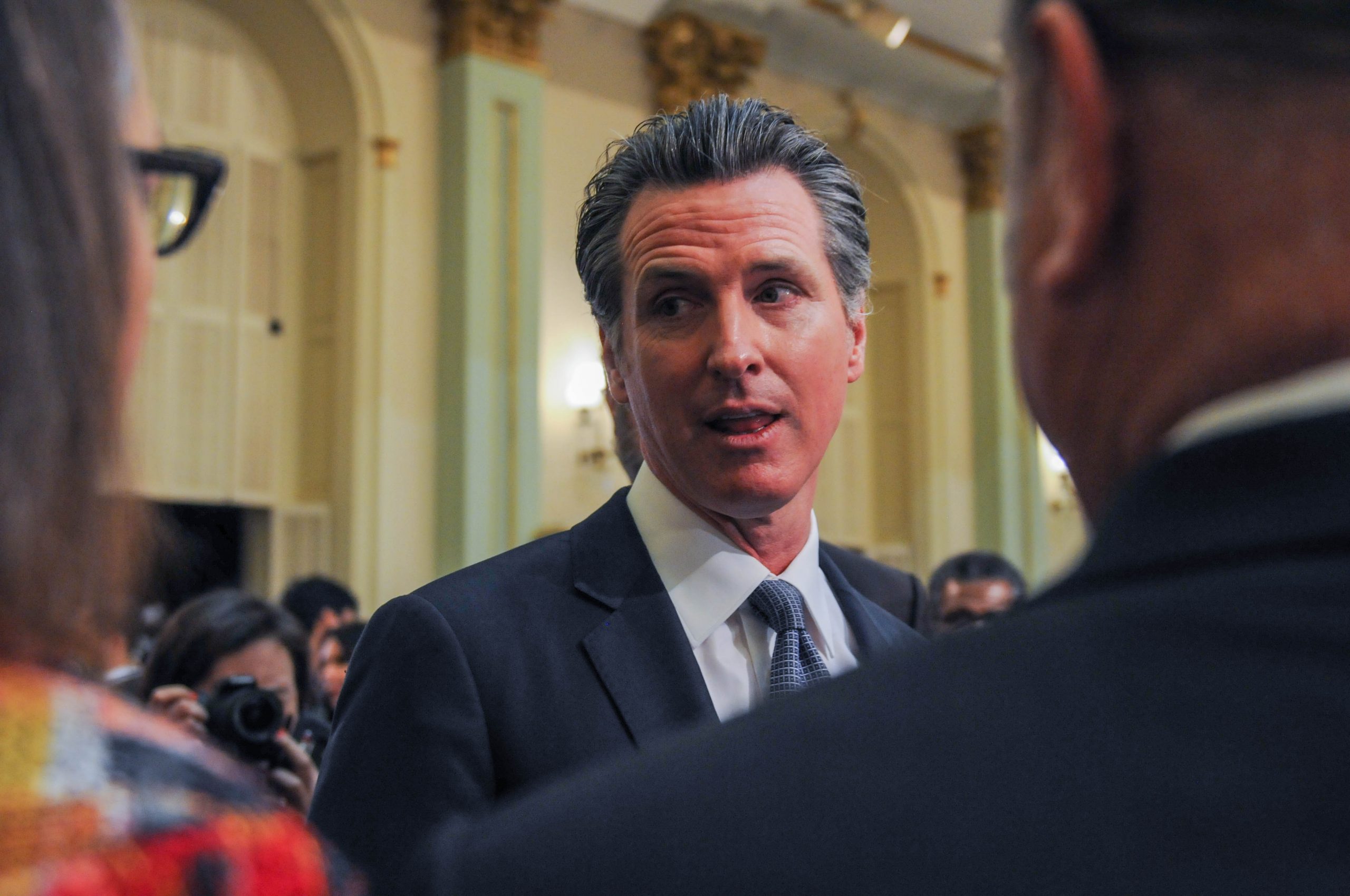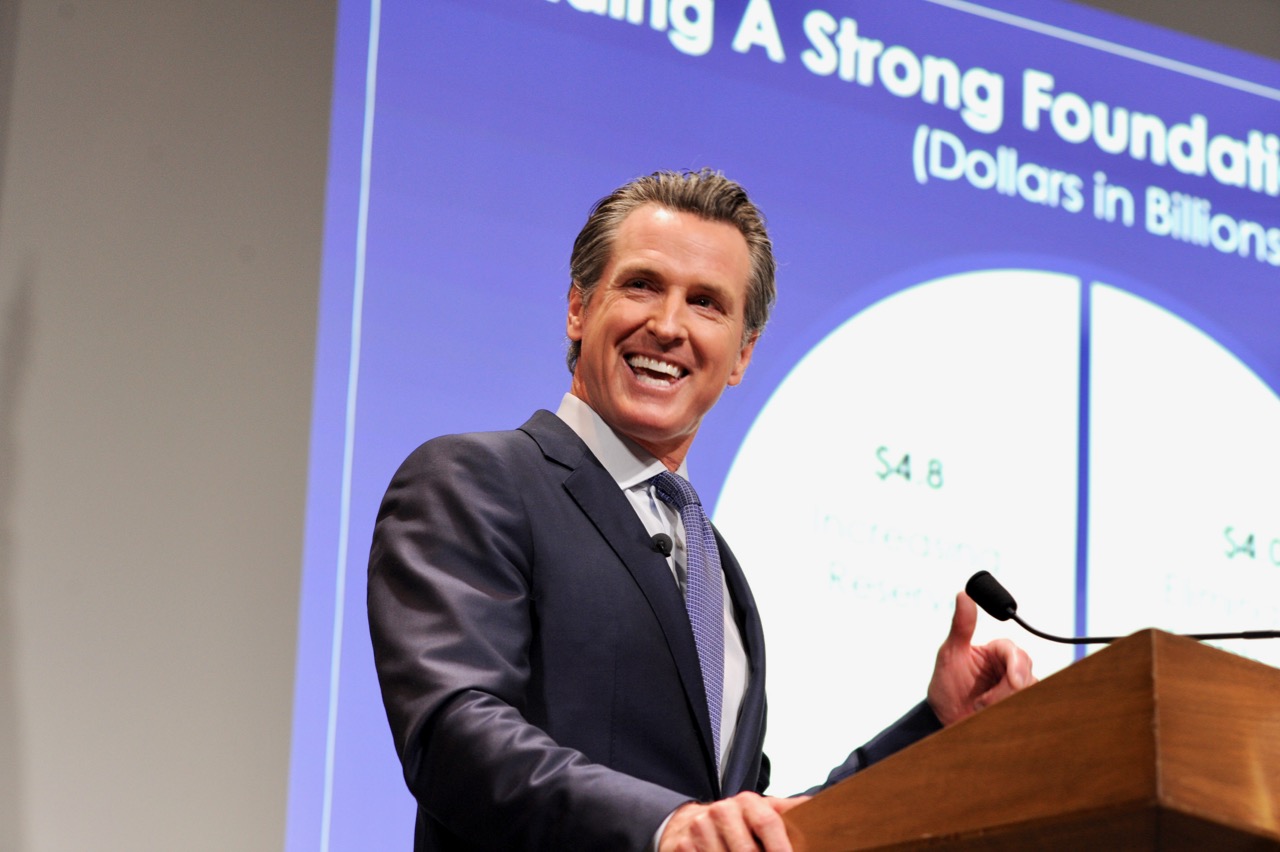
Gov. Gavin Newsom. (Photo: Kevin Sanders for California Globe)
Governor’s Vetoed Labor and Employment Bills 2020
Duplicative laws, new borrowing of federal funds
By Chris Micheli, October 2, 2020 6:48 am
As he finished considering over 400 bills sent to his desk, Governor Gavin Newsom vetoed a number of key labor and employment bills from the 2020 Legislative Session. These included the following measures:
AB 1066 (Gonzalez)
This bill would have required, on and after January 1, 2021, that if an employer, within 10 days after receiving an initial notice from the director of the need to furnish over required records or reports necessary for a full determination of a claim for unemployment compensation benefits, fails to furnish those required records or reports to the director, it would be conclusively presumed that the claimant is entitled to the maximum total benefits payable, unless the director determines, based on the evidence, that the claimant is entitled to a lesser amount.
Governor Newsom wrote: “This bill would conclusively presume that a claimant is entitled to the maximum benefit amount for the purposes of unemployment insurance if an employer does not furnish requested wage information for the Employment Development Department (EDD) within 10 days after receiving notice. Current law already entitles a claimant to the maximum benefit amount if the employer does not provide documents responding to a claim within a reasonable time frame. By conclusively presuming an individual is entitled to the maximum benefit amount after 10 days, this bill will result in significant new borrowing of federal funds to the Unemployment Insurance fund, increasing interest costs borne by the state General Fund. These costs are not included in the 2020 Budget Act and will add cost pressures on state funds that are already strained because of the pandemic.”
AB 1457 (Cervantes & Reyes)
This bill, upon appropriation by the Legislature, would have required the Employment Training Panel to establish a pilot project to enhance the regionally focused statewide business training center network of community college contract education centers to partner with other assistance providers serving small businesses. The bill would have authorized the pilot project to be guided through a partnership with the Employment Training Panel, including the California Community Colleges, the Governor’s Office of Business and Economic Development, the Labor and Workforce Development Agency, and the California Workforce Development Board.
Governor Newsom wrote: “This bill would require the Employment Training Panel to establish a pilot project to enhance a regional business training center network of community college contract education centers to partner with other assistance providers servicing small businesses. While I am highly supportive of training programs that lead to quality jobs and support businesses, particularly in the midst of our current economic climate, this bill does not have the dedicated funding to support the pilot program and could divert funding from other core workforce training programs. Moreover, this bill is duplicative of current planning efforts by the California Community Colleges and Workforce Development Boards to create a better integrated workforce development system. I look forward to working with these partners, and the Legislature, on achieving that shared goal.”
AB 3216 (Kalra)
This bill would have required an employer in specified industries to offer its laid-off employees specified information about job positions that become available for which the laid-off employees are qualified, and to offer positions to those laid-off employees based on a preference system, in accordance with specified timelines and procedures. The bill would also have required an incumbent employer, within 15 days after the execution of a transfer document, to provide to the successor employer specified information pertaining to eligible employees and would require the successor employer to maintain and hire from a preferential hiring list for a specified time period.
Governor Newsom wrote: “This bill would provide a right of recall and retention for specified employees previously laid-off due to a local, state, or federal declaration of a public health-related state of emergency. It would require specified employers to offer the same or similar jobs to laid off employees or those which the laid off employee could be trained to do, based on seniority. The bill additionally would require employers who hire an individual other than a laid-off employee to provide that laid-off employee with the name of the individual who was hired and all the reasons for that decision. It would also require successor employers in these specified industries, regardless of the existence of a state of emergency, to give preference in hiring to employees of the incumbent employer by seniority. I recognize the real problem this bill is trying to fix – to ensure that workers who have been laid off due to the COVID19 pandemic have certainty about their rehiring and job security. But, as drafted, its prescriptive provisions would take effect during any state of emergency for all layoffs, including those that may be unrelated to such emergency. Tying the bill’s provisions to a state of emergency will create a confusing patchwork of requirements in different counties at different times. The bill also risks the sharing of too much personal information of hired employees. There must be more reasonable tools to effectively enforce the recall provisions. Finally, the hospitality industry and its employees have been hit hard by the economic impacts of the pandemic. I believe the requirements of this bill place too onerous a burden on employers navigating these tough challenges, and I would encourage the legislature to consider other approaches to ensure workers are not left behind.”
SB 1102 (Monning)
This bill would have required an employer to include in their written notice to all employees specified information required in the event of a federal or state declared disaster or applicable to the county or counties in which the employee will be employed. The bill would have prohibited an employer from retaliating against an employee for raising questions about the declarations’ requirements or recommendations.
Governor Newsom wrote: “SB 1102 would require an employer of H2-A employees to provide a specified notice about state and federal declared disaster information about the counties where the employees may be working. This bill would additionally require an employer to provide an H-2A employee a written notice in Spanish containing specified information relative to an H-2A employee’s rights pursuant to federal and state law. SB 1102 would also amend the Labor Code to include the full language of the required notice and requires the agency to issue a template that is “substantially similar.” While I applaud the intent of this bill to create accessible and easy to understand notifications, this statutory construction departs from previous H2-A notice requirements like those found in Labor Code Section 2810.5 and prevents the agency from amending the template when new laws are passed or new court decisions affect the rights and obligations of H2-A employers and workers. Therefore, I am directing my Labor and Workforce Development Agency to develop and maintain a template contemplated in this bill to make available to H2-A employers, and I am returning SB 1102 without my signature.”
- Definitions and Interpretation Principles in the Commercial Code - February 1, 2025
- Jurisdiction in Limited Cases in California - January 31, 2025
- Local Agency Design-Build Contracting - January 30, 2025




